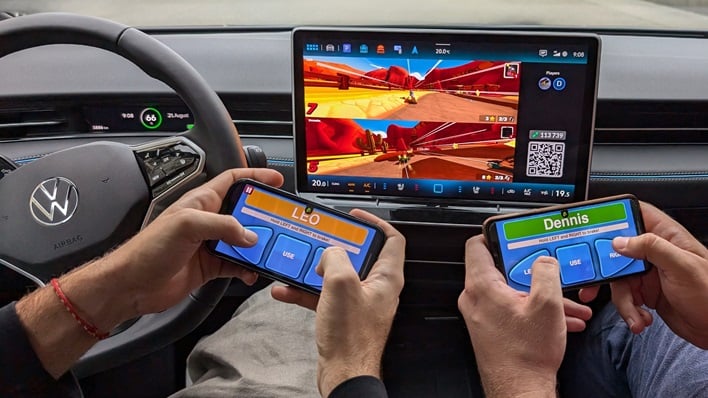
Volkswagen looks to up its in-car entertainment, with online video game console designer AirConsole riding shotgun. AirConsole will be available in upcoming ID.7, ID.5, ID.4, ID.3, Passat, Tiguan, Golf, and Golf Estate models via the infotainment display. This is separate from the automaker’s collaboration with Microsoft and its HoloLens hardware.
The German car company partnered with AirConsole to bring an online gaming platform to certain Volkswagen models, providing entertainment to people on the road when charging or during a stop at a rest area. Games will be made available via the infotainment display, which Volkswagen says “is transformed into a game console,” with players using their smartphones as controllers.
“For the in-car gaming experience, the players simply need their smartphone, which acts as a controller, and the VW Active Info Display,” Volkswagen remarked in a press release. “After starting the AirConsole app in the vehicle, the connection between the smartphone and the vehicle is intuitively established by scanning a QR code on the display screen. Then players can get straight down to playing.”

AirConsole does allow for multiple players simultaneously, with rear passengers being able to participate in the fun during stops. The company says it is possible to play alone, or with all passengers in a vehicle together, while parked, of course.
In terms of games included, AirConsole offers over 130 games designed to fit its unique multi-screen setup. There are games across different genres, such as racing, sports, puzzle, and co-op. Games come from Steam, PlayStation, Xbox, Switch, AirConsole, and the AirConsole developer community. According to the game company, games are optimized to run locally, on the device itself, bypassing the need for hyper-fast internet connections typically required for game streaming.
The ability to use AirConsole will not be unique to Volkswagen, as it has already been made available in certain BMW models. Volkswagen expects to launch AirConsole in the first European countries from mid-September, while planning to extend the service to even more European countries by the turn of 2024/2025. There was no mention of if, or when, it might come to the US.